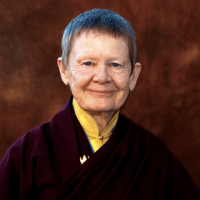
An Excerpt from Welcoming the Unwelcome by Pema Chödrön. ~ Ed.
Joan Didion wrote a book some years ago called The Year of Magical Thinking.
It’s about the year following an abrupt change in her life, which was her husband’s unexpected death. In addition to this book’s poignancy and clarity, it also provides an accessible way of going deeper into what it means to go beyond labeling and connect to the mind of open awareness.
She and her husband had come back from the hospital, where their 39-year-old daughter—and only child—was in a coma and in very serious condition. They had just sat down for a late dinner. She was focused on mixing the salad and he was enjoying a Scotch. They were talking to each other, and all of a sudden, he wasn’t talking. He had died, just like that.
Soon after he died, she wrote something on her computer. The next time she opened her computer, which was months later, she read what she had written: “Life changes fast. Life changes in the instant. You sit down to dinner and life as you know it ends.”
When I read these words, they resonated deeply with me. They brought to mind experiences where a sudden shock completely altered my usual, conventional, held-together view of reality. And it occurred to me that millions of people have had this kind of experience, this out-of-the-blue moment where your world completely falls apart. You don’t have to be a Buddhist practitioner—I don’t believe Joan Didion is one—to go through such abrupt and drastic changes to your concepts of how things are.
Dzigar Kongtrul Rinpoche talks about how all of us, whether we want to or not, live in a bubble. This is our own version of reality, created by our ego, which is always turning away from the open-ended nature of how things are and trying to maintain the familiar. Most of the time, we are able to keep this sense of familiarity intact. Everything in our bubble is fairly predictable and seems to make sense. Even if we’re going through a hard time, at some level we’re able to hold it all together. We get up in the morning, we enter a familiar world, we go through our day with many familiar routines. How we prepare our food, how we have our coffee, how we relate to particular people in particular ways—it’s all pretty unsurprising. This isn’t something we consciously choose to do. Whatever kind of life we have, we have our own version of a bubble. It’s our default way of being, and most of the time, we don’t even know we’re doing it.
Even Joan Didion, a sophisticated woman with a rich and varied life, was living in a bubble. She knew her husband had a heart condition that might one day prove fatal. But when she thought about the end of their time together, her thoughts would take the form of dramatic fantasies. She imagined, for example, that they’d be swimming in a cave they used to go to and the water would rise up, and they would drown together. That was “the kind of conclusion I anticipated,” she wrote. “I did not anticipate cardiac arrest at the dinner table.”
The first time something like this happened to me, I was also in the middle of a mundane activity. I was sitting in front of my house in New Mexico, I heard the car door slam, my husband walked around the corner, he told me he was having an affair and wanted a divorce, and—wham!—life as I knew it had ended.
I hadn’t connected with the Buddhist teachings yet, so I had no frame of reference. Then, years later, I received my first teachings on shunyata. This Sanskrit word is most commonly translated as “emptiness.” As so many people do, I, at first, misunderstood it.
Emptiness can easily sound like a void, an absence, a state of non-existence. Some people have a notion that it’s like being thrown out of a capsule in outer space and floating away for all eternity. The image I had around emptiness was like the Haunted Mansion ride at Disneyland, where the little car takes you through the house and you see all those ghostly hologram figures walking around. It took me a while to connect emptiness to what I had experienced that day in New Mexico, or to other experiences where my bubble had suddenly burst.
Nothing in our conceptual framework can prepare us for the experience of “life, as you know it, ends.” The way our mind perceives and holds things doesn’t operate anymore. All our reference points are gone; how we normally conceive of reality just doesn’t work. Although she doesn’t use the same language, I believe that Joan Didion is describing an experience of emptiness. It’s the experience of everyone whose world falls apart in this way.
When we talk about emptiness, it’s important to clarify what “empty” refers to. The word “tree” is just a convenient name for a collection of parts—trunk, limbs, leaves—that are always changing, day by day, instant by instant. We label it all as a “tree,” but that label is just in our minds.
In reality, there’s nothing we can pin down with our limiting concepts. There’s nothing permanent or solid we can hold on to. And this is true not only of trees, but of everything in the universe, including “you” and “me.” Everything is empty of fixed ideas and labels. But at the same time, a tree doesn’t disappear when we recognize its emptiness. We just see it more clearly as it really is: fluid, open-ended, and interconnected with everything around it.
Another way of talking about emptiness is to say that things are “free of imputed meaning.” Instead of experiencing things simply as they are, our mind imputes extra layers of meaning onto them. This may sound very intellectual, but imputing meaning is something we all do, continually. For example, think about how you feel when you say “a nice cup of tea.” How about “a hot shower” or “my puppy”? Do you think about the object just as it is, or is there another layer of meaning on top? To many of us, a nice cup of tea or coffee has the additional meaning of “comfort.” Money in the bank can mean “security.” A certain pair of shoes can mean “good taste.” A spouse can mean “confirmation.” But are any of these meanings actually in these objects?
When our bubble is burst by sudden events, our imputed meanings are torn away. I read the account of a woman who was rushing to work on September 11, 2001. She was so obsessed with a presentation she had to do that she’d hardly been aware of anything else since waking up in the morning. She wasn’t even sure she’d had breakfast. Her entire world was in her head. Then she walked up out of the subway station right at Ground Zero, and life as she knew it ended. One of the poignant details she wrote about was how the air was filled with paper blowing around. All those important documents and presentations had simply become loose pieces of paper floating through the air. Their imputed meanings had vanished.
Sudden experiences of emptiness can be triggered in all kinds of ways. Sometimes it’s a piece of information. I knew someone who, when he was about 18, went through a profoundly unsettling experience after finding out he had been adopted. His adoptive parents had been very kind to him and nothing really bad had happened in his childhood, yet the discovery immediately upended the version of reality he had unknowingly constructed. Up to that point, he had lived his whole life assuming that the mother who had raised him had given birth to him and that his father had also been with him from day one. This reality was so finely integrated into his being, that when he found out the truth, he had a major experience of groundlessness. Not only were the meanings of “mother” and “father” undermined, but his very own identity had also come into question.
When your bubble bursts, even the most ordinary things in your life—your furniture, your neighbor, how you walk down the street—are stripped of their extra layers of imputed meaning. You find yourself in a groundless, open space. This can last for just a moment, or—in the case of a severe shock, like Joan Didion’s—it can last much longer. If your world is so radically upended, it may take a long time to put it back together, to get some kind of ground back under your feet.
In her book, Didion writes about how her usual routines and relationships and so forth took on a quality of meaninglessness. Though this word has a bleak connotation, when she contemplated it further, she found something more to it than bleakness. As she experienced—and as I and many others have experienced—when you have this sense of meaninglessness, you know you’ve connected with some kind of wisdom. You know you’re onto the truth. You look out of your eyes and see the same old world, but it no longer has the fictitious meaning you imbued it with. It strikes you that, in a way, you’ve been making up your whole world all along.
When our bubble bursts, we can recognize that we are walking through a very important doorway. Then we can experiment with hanging out on the other side of that doorway. We can learn to relax there. Eventually, we can even fall in love with emptiness, as Anam Thubten likes to say. My teachers, and the other people I’ve encountered who have learned to live in this open space free of imputed meaning, are the most fearless, compassionate, and joyful people I have ever known. They are living examples of what this kind of falling in love can do.
~
From Welcoming the Unwelcome by Pema Chödrön © 2019 by the Pema Chödrön Foundation. Reprinted in arrangement with Shambhala Publications, Inc. Boulder, CO.











Read 2 comments and reply